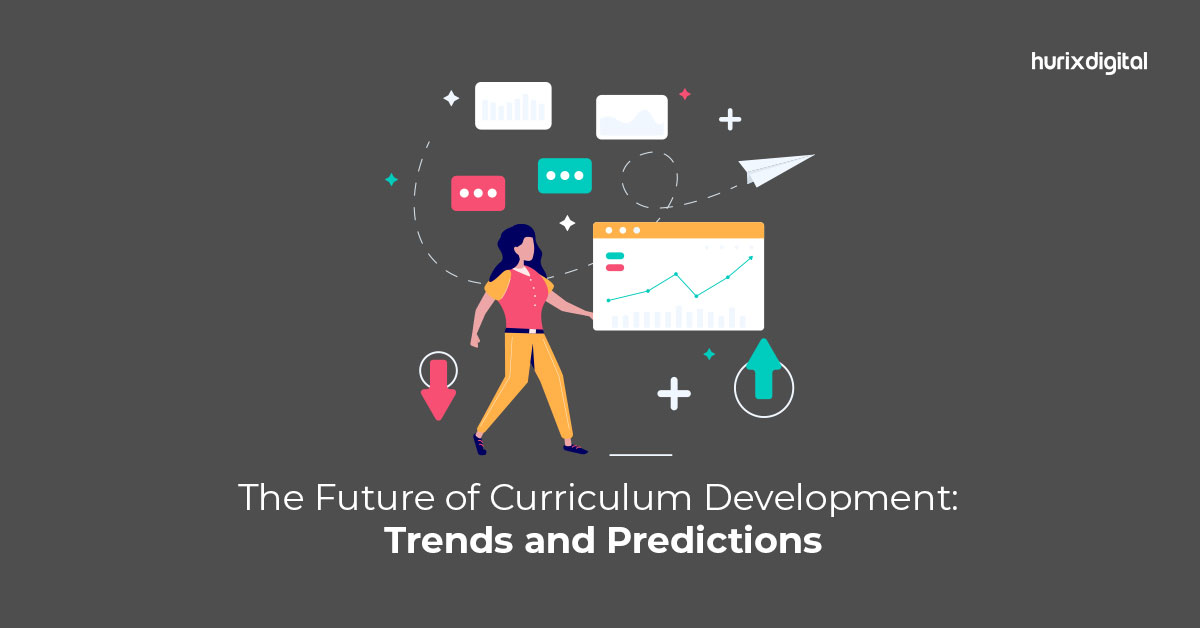
Beyond Print: End-to-End Services for Multi-Format Publishing
Summary
The blog post highlights ten emerging trends poised to transform K12 curriculums significantly. These trends encompass blended, personalized, and immersive learning experiences. It advocates for partnerships with EdTech firms to integrate these innovations.
Table of Contents:
- Introduction
- Ten Trends That Will Shape the Future of Curriculum Development
1. Blended Mode Of Learning
2. Personalized Learning
3. Gamification
4. Collaborative Learning
5. Immersive Learning
6. Mobile-First Learning
7. Micro-Learning
8. Disability-Accessible Learning
9. Social-Emotional Learning
10. Project-Based Learning - Summing Up
- Frequently Asked Questions (FAQs)
Introduction
The pandemic spurred a lot of changes in the educational sector as well as others. Now, innovations are happening in many fields at a fast pace, but the education sector is lagging. It has a lot of catching up to do. And a good place to start is bringing changes to the curriculum.
Curriculum lies at the core of every course and learning process. Making thoughtful improvements to it is the only way to go forward.
In other words, curriculum development is the need of the hour.
Ten Trends That Will Shape the Future of Curriculum Development
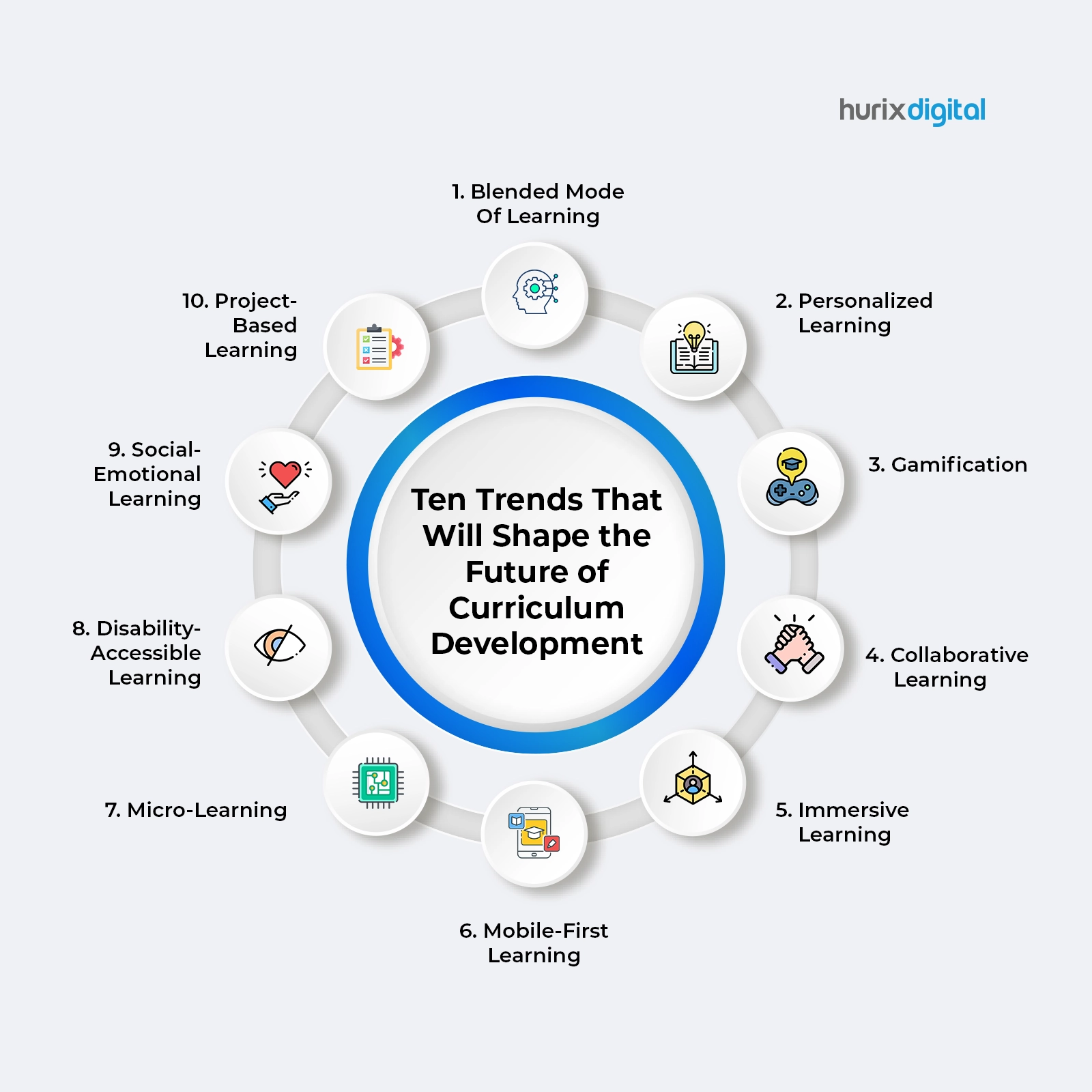
1. Blended Mode Of Learning
Blended or hybrid learning is gaining popularity for making education accessible and attainable for every student, especially those living in remote areas.
Blended learning brings together the good features of classroom learning and online learning. It provides students with the option of virtually attending classes from their homes or physically attending classes in school.
Blended learning makes education flexible and, at the same time, better structured and enhances students’ learning experience.
2. Personalized Learning
Every student has a different learning style. Being cognizant of this, personalized learning takes a student-centric approach and tailors learning courses in a way that meets the need of every student. It imparts knowledge through different mediums, including textbooks, video and audio lectures, storytelling, etc.
Combining the powers of AI and personalized learning will make education more impactful and powerful and develop a self-driven and accountable attitude from an early age in students, which will help them through their adult life.
3. Gamification
Gamifying the way education is delivered with the help of K12 ed-tech companies will make education engaging. It will also increase students’ interest and encourage them to participate actively in learning activities.
In addition, it will motivate the students to perform better and rank higher on the leaderboard than they do now.
Gamification will improve the overall learning process and result in the formation of an interactive classroom environment.
4. Collaborative Learning
Collaborative learning revolves around the concept of students teaming up in small groups to work on a task, create a product, or solve a problem. Working together facilities discussions among students and helps them voice their points of view.
Listening to differing points of view develops the quality of open-mindedness and also improves their understanding of concepts.
Besides increasing the engagement of students, collaborative learning builds interpersonal skills, which are pre-requisite for success in every field today.
5. Immersive Learning
Digital curriculum providers now offer VR (virtual reality) and AR (augmented reality) based learning. VR and AR enable students to interact with their course material in 3D, thus creating an immersive learning experience.
They simplify complex concepts by making them realistic and also add an element of exploration to the learning process.
AR and VR are expected to grow at 18.2% CAGR from 2022-27 in the education sector. As a result, in the future, AR and VR will completely change the way students learn and the way teachers teach.
6. Mobile-First Learning
Statista expects there to be 7.49 billion mobile phone users globally by 2025. This means that mobile-first learning is here to stay.
Mobile-first learning refers to accessing the course content on mobile-based devices. It allows students to access the educational resources at a time and place of their convenience.
Implementing mobile-first learning will ensure that learning continues to take place outside the boundaries of the classroom.
7. Micro-Learning
Micro-learning, also known as bite-sized learning, is an approach to learning where complex topics are divided into small digestible chunks. Micro-learning prevents burnout by reducing cognitive overload.
It also improves students’ focus and leads to better retention of knowledge. Owing to the benefits of micro-learning, many K12 curriculum development companies now offer course material in the form of multimedia-rich bite-sized chunks.
8. Disability-Accessible Learning
A current trend in curriculum development is about making learning accessible to K12 students with disabilities, including blindness, speech deficits, deafness, photosensitivity, etc.
Owing to this, educational institutions have started ensuring that their websites are WCAG-compliant. Many e-learning K12 companies have also started providing screen-reader-friendly and easy-to-understand content that includes the learning needs of differently-abled students.
10. Project-Based Learning
Alternatively referred to as learning by doing, project-based learning (PBL) is a teaching strategy intended to allow students to build their skills and knowledge through projects based on problems and obstacles they may encounter in the real world.
PBL fosters the development of technical abilities and skills in students and prepares them to face the workforce. At the same time, PBL stimulates the growth of soft skills like problem-solving, team-working, and critical thinking skills.
PBL focuses on providing a holistic learning experience to K12 students, so implementing it in curriculum development is of utmost importance.
Summing Up
The curriculum of K12 students needs to undergo a lot of developmental changes. Implementing the current and emerging trends in the curriculum of your educational institution is a great place to start.
It’s no secret that transforming the curriculum alone can be time- and resource-extensive. So, if you want a hassle-free curriculum development experience, reach out to Hurix.
Hurix offers custom learning solutions for elementary, middle, and high school student’s education. It provides multilingual multimedia-rich content, game-based learning, simulation-based learning, and more. In addition, Hurix is the trusted preference of educational companies like Wiley, Cambridge University Press, Carnegie Learning, etc.
To expedite your curriculum development process, connect with Hurix.
Also Read – How to Find the Right Curriculum Development Service Provider
Frequently Asked Questions (FAQs)
1. How does gamification impact education, and what are its advantages?
A. Gamification engages students, increasing interest and motivation. It fosters active participation, improves the learning process, and creates an interactive classroom environment.
2. What is immersive learning with VR and AR, and how will it revolutionize education?
A. Immersive learning through VR and AR offers 3D interaction with course material, simplifying complex concepts and transforming the learning experience. It’s expected to revolutionize education by changing how students learn and teachers teach.
3. How is curriculum development addressing accessibility for students with disabilities?
A. Curriculum development focuses on making learning accessible to students with disabilities, ensuring WCAG compliance, screen-reader-friendly content, and meeting the diverse needs of differently-abled learners.
4. How can educational institutions implement emerging trends in curriculum development?
A. Educational institutions can implement emerging trends by embracing blended learning, personalized learning, gamification, and other innovative approaches to create a modern curriculum.
5. What are the benefits of choosing custom learning solutions from Hurix for K12 education?
A. Hurix offers custom learning solutions for K12 education, including multimedia-rich content, game-based learning, and simulations. These solutions enhance the educational experience and are trusted by reputable educational companies.

Vice President – Digital Content Transformation. He is PMP, CSM, and CPACC certified and has 20+ years of experience in Project Management, Delivery Management, and managing the Offshore Development Centre (ODC).
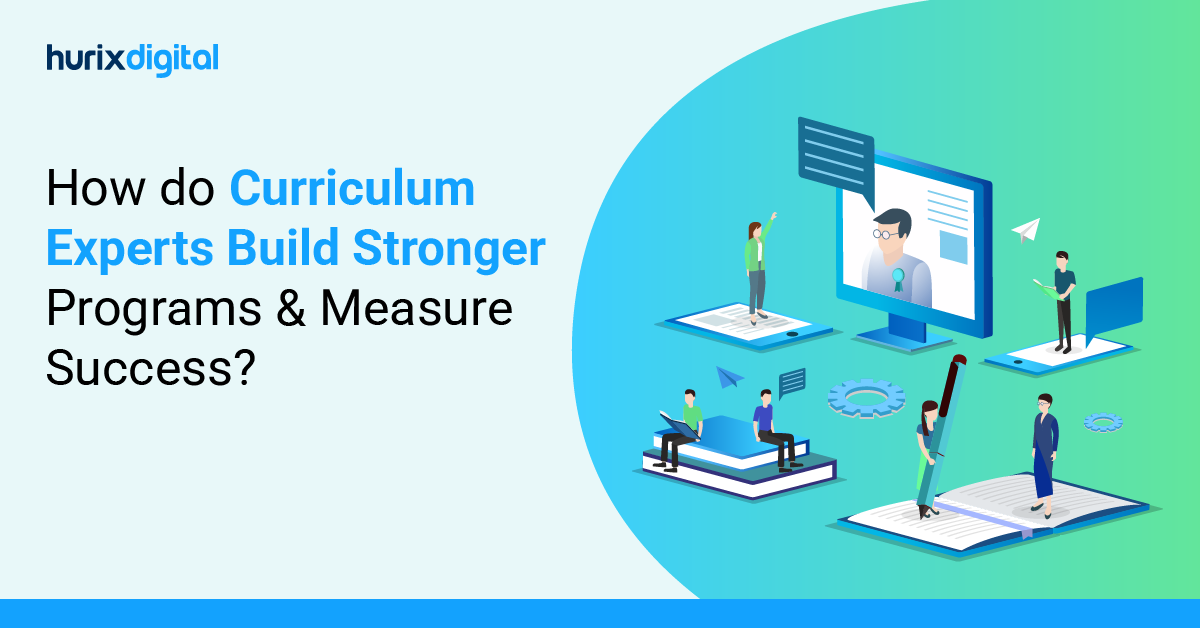

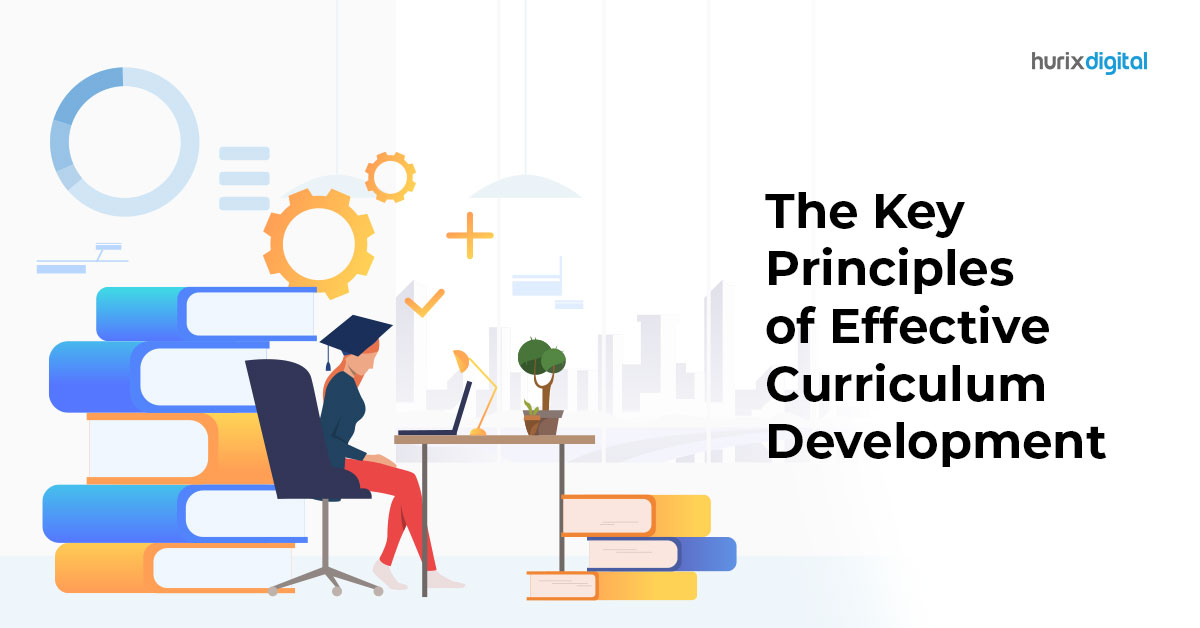
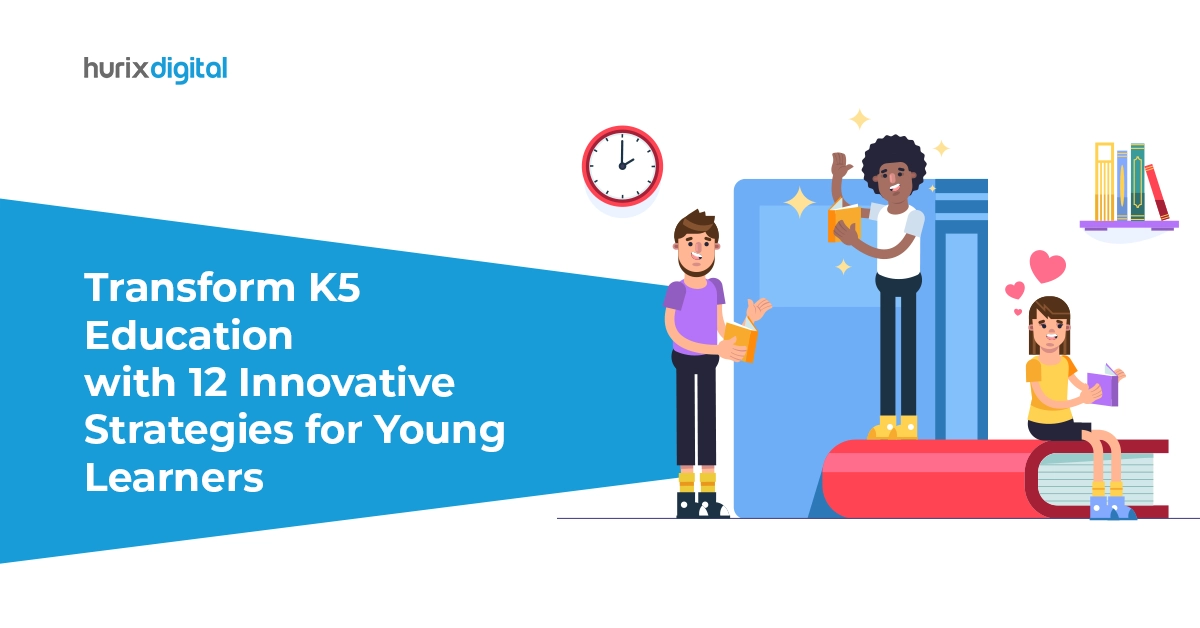
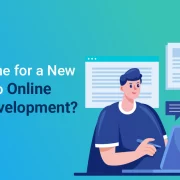
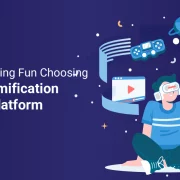


9. Social-Emotional Learning
The pandemic brought the mental health crisis to the forefront. The likelihood of children suffering from stress, anxiety, depression, and other mental health disorders has drastically increased.
Suicide has reportedly become the second leading cause of mortality among 10 to 14-year-olds. All this has created a need to include social-emotional learning (SEL) in educational content development.
SEL focuses on developing self-awareness, control, management, and interpersonal skills of K12 students and teachers through academic resources, systems, and programs. It also assists them in becoming mentally and emotionally strong.